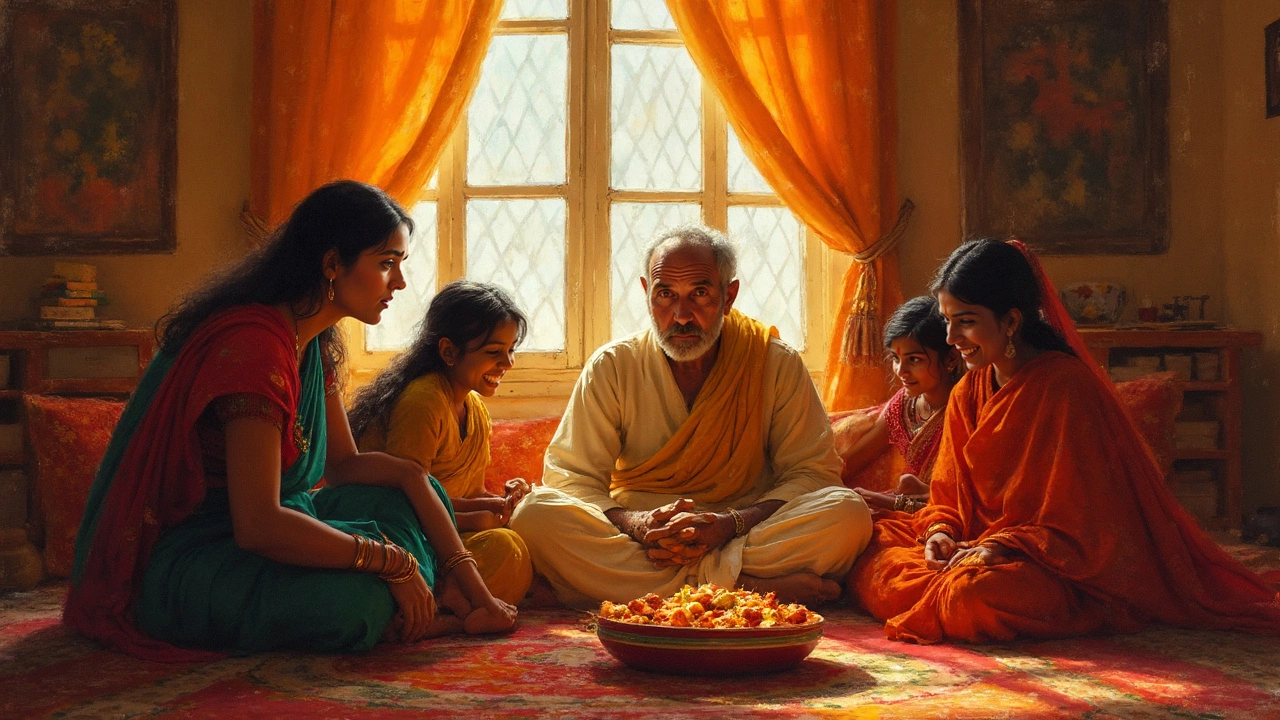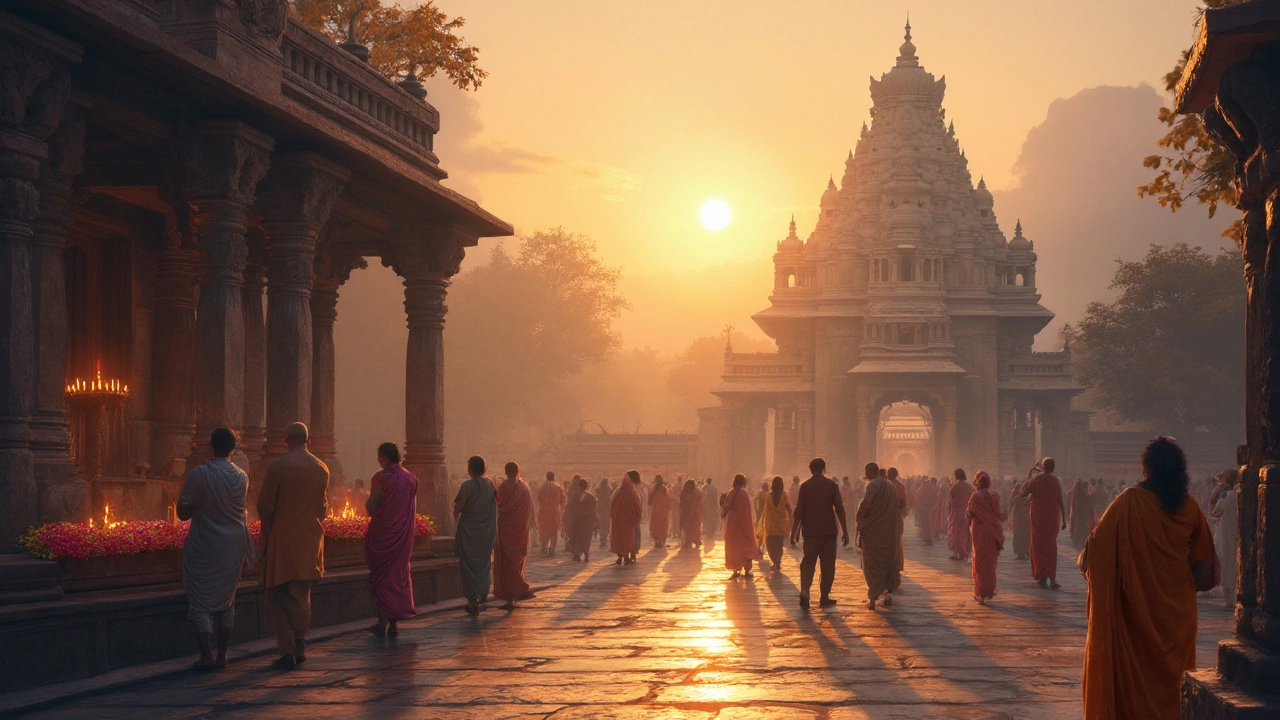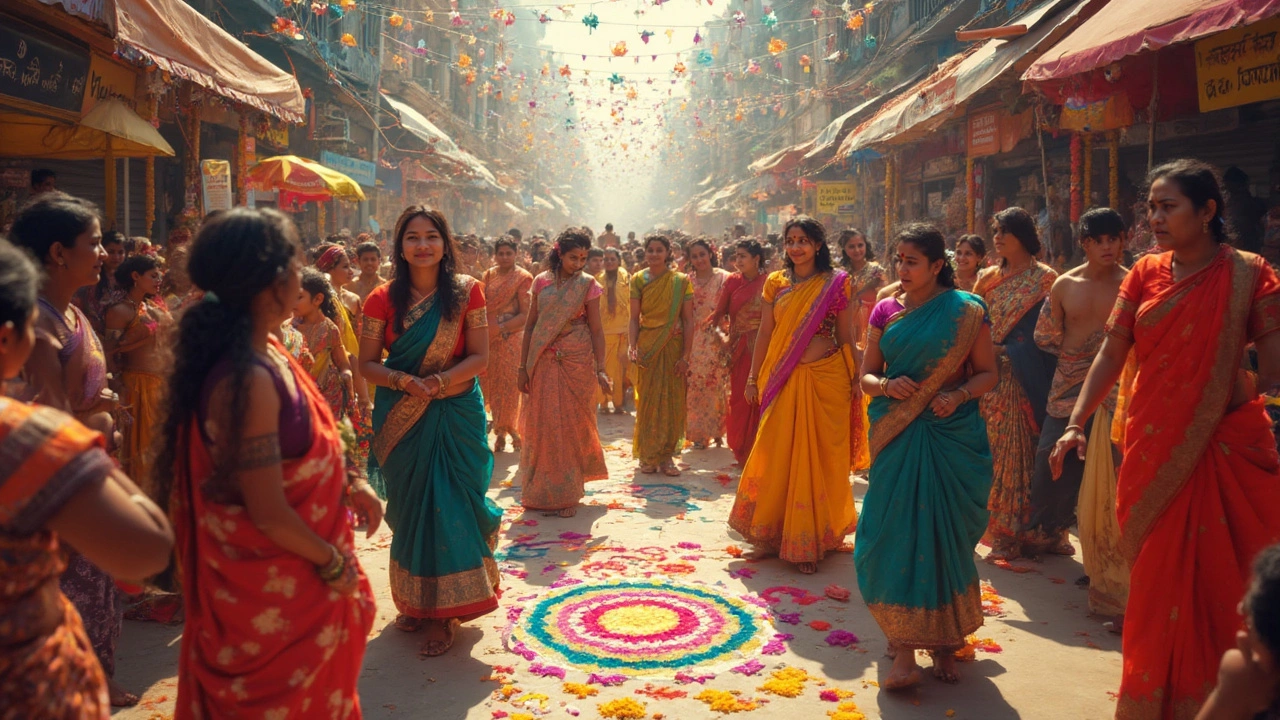Exploring Three Core Values of Indian Culture
 Mar, 20 2025
Mar, 20 2025
Family isn't just a word in India; it's a way of life. From big celebrations to small daily meals, everything centers around family ties. Whether it's the wise grandparent stories or the sibling squabbles, family bonds are given great importance. It’s what keeps everyone connected, no matter where life takes them.
Now, let's talk about respect for elders. In India, there's an unspoken rule that seniors are to be revered. A simple namaste gesture isn’t just for greetings; it’s about showing respect, acknowledging wisdom, and maintaining harmony. This level of respect extends to listening and valuing the advice of elders, which deeply influences familial decisions.
- Importance of Family
- Respect for Elders
- Spirituality and Religion
- Role of Traditions
- Influence on Modern Life
Importance of Family
Family is the heart of everything in Indian culture. It shapes individuals' lives from childhood to adulthood, playing a central role in personal and social identity. Families are often large and extended, with multiple generations living under one roof. This setup fosters a deep sense of togetherness and support.
In India, joint families are more common than nuclear ones. The idea is simple: everyone looks out for each other. From taking care of the young to respecting the wisdom of the elders, everyone has a role. When decisions are made, they're usually collective, with family members weighing in and offering guidance.
The Role of Traditions
Traditions are passed down through generations, making family gatherings a mix of shared history and rituals. From festivals to daily prayers, these traditions strengthen family bonds and instill values. For example, during Diwali, families come together to celebrate, light lamps, and enjoy festive meals. It's not just about the festival itself, but about the unity it brings.
Family Support Systems
Families in India are robust support systems. If someone faces a crisis, the family rallies to offer help, whether emotional, financial, or physical. This network often extends beyond immediate family members to include cousins, aunts, and uncles. It's no surprise that many Indians rely on their families for crucial support throughout their lives.
A Modern Twist
While traditional values remain strong, the concept of family is evolving, especially in urban settings. Work demands and lifestyle changes are leading more people to adopt nuclear family setups. However, technology keeps extended families connected, with video calls and social media bridging the gap. There's a growing blend of old and new, where individuals cherish traditional values while adapting to modern lifestyles.
Respect for Elders
In Indian culture, respecting elders is not just about age; it’s about acknowledging wisdom and experience. This value is deeply ingrained, influencing everything from daily interactions to important family decisions.
Respect manifests in unique ways. For instance, the iconic gesture of touching feet, known as 'charan sparsh,' is a common practice among youngsters to seek blessings. It’s more than a formality; it’s a heartfelt expression of gratitude and respect.
Why It Matters
The idea of reverence is rooted in the belief that elders possess a lifetime of knowledge. Their advice is taken seriously, often guiding decisions about education, marriage, and finances. Elders often play key roles in preserving Indian traditions, ensuring they are passed on to younger generations.
"Respect for those older than oneself is the basis of civic society, and more than that, it is in itself a fundamental need of human beings." – Mahatma Gandhi
This respect isn’t limited to family; it extends to educators, leaders, and anyone possessing experience and knowledge. In schools, teachers are often viewed as authority figures to be treated with the utmost respect, echoing the sentiments shown at home.
Evolving Rituals
Although traditional practices continue, modernization is influencing how respect is shown. Urban families might not follow every ritual, but the sentiment remains. Simple acts like offering a seat to an elder on public transport are still common.
In essence, respect for elders is a constant thread in the life in India, adapting with time but staying true to its core. It holds the community together, offering a shared sense of belonging and continuity.

Spirituality and Religion
Spirituality and religion in Indian culture can't be overstated. It's like the heartbeat of daily life, coloring everything with meaning and purpose. India is home to a wide array of religions including Hinduism, Islam, Christianity, Sikhism, Buddhism, and Jainism, among others. Each brings its own unique festivals, traditions, and practices. Ever heard of Diwali? It’s the festival of lights that celebrates the victory of good over evil, and it’s just one example of how spirituality brightens lives here.
Whether it's the sacred Ganges River or the vibrant temples seen in every city, spiritual places are more than just tourist spots; they are vital spaces for reflection and connectivity. Daily rituals, like lighting a lamp at home or visiting a temple before starting the day, add a comforting routine to life.
Role of Rituals
Rituals play a key role in maintaining spirituality. They can be as elaborate as a multi-day wedding ceremony or as simple as saying a prayer before meals. These acts foster a sense of community and continuity with the past. They give people opportunities to pause, reflect, and express gratitude amidst life's chaos.
Community and Belonging
Religion also promotes a sense of belonging and shared identity. For instance, during the Kumbh Mela, one of the largest peaceful gatherings in the world, millions of Hindus congregate to bathe in sacred rivers. Events like these are not just religious obligations but deeply cultural moments that forge strong community bonds.
Additionally, many Indians believe in universal values like karma, the idea that one’s actions directly affect their future. This belief in karma often guides personal ethics and decisions, reinforcing positivity and moral behavior.
Indian spirituality isn't a personal journey alone; it's a shared experience that knits the social fabric. In a world that’s increasingly going global, such deep-rooted beliefs provide both comfort and guidance to millions.
Role of Traditions
In India, traditions are like the threads that weave the fabric of life, making everything vibrant and meaningful. They're not just about doing things the old way; they create a sense of identity and belonging. These customs bring communities together, giving people a feeling of shared history and future.
Festivals and Celebrations
Think of Indian festivals like Diwali and Holi. They're more than just parties; they’re a way for people to connect with their roots and each other. Diwali, the festival of lights, isn't just about fireworks; it's about triumph over darkness, symbolized by lighting diyas, or oil lamps, and sharing sweets and happiness with family and friends. Holi, on the other hand, is all about colors and new beginnings, celebrating the arrival of spring with a riot of colors.
Passing Down Generational Knowledge
Traditions also serve as a bridge between generations. Ever notice how a lot of wisdom comes from grandma's kitchen? Traditional recipes and remedies are passed down like treasures, keeping ancestral knowledge alive in a world that's changing fast. It's not just about food; it's about family gatherings, festive meals, and the love that goes into preparing them.
Traditional Attire and Rituals
And let's not forget our beautiful attire. Sarees, turbans, and dhotis are not mere garments, they symbolize cultural richness. Wearing traditional outfits during festivals or weddings isn’t just about looking good; it’s about honoring heritage.
| Festival | Significance |
|---|---|
| Diwali | Celebrates the victory of light over darkness |
| Holi | Marks the change of seasons and the joy of spring |
Ultimately, Indian traditions aren't about sticking rigidly to the past. They're evolving, adapting, and growing with time, making them even more significant today. They remind us of our roots while also celebrating our future possibilities, keeping us grounded yet open to change.

Influence on Modern Life
The values of Indian culture, especially the focus on family and spirituality, continue to play a critical role in the fast-paced world. Even with modern pressures and bustling city life, these foundational principles guide daily decisions and interactions in India.
Balancing Tradition with Modernity
It’s not uncommon to find professionals living in tech hubs like Bengaluru who still rely on family advice when making big life decisions. Many youngsters, even while being exceptionally tech-savvy, often seek parental blessings before venturing into new jobs or business endeavors. This fusion keeps traditions alive, even in the most contemporary neighborhoods.
Religious and Spiritual Influence
While India embraces technological advancements, spiritual practices remain significant. You’ll find many engaging in yoga and meditation not just for tranquility but as daily rituals that ground them. Spirituality in India isn’t just confined to religious places; instead, it flows into everyday routines, reminding everyone of their cultural roots.
Elders' Role in Modern Families
The practice of living in joint families, although evolving, is still prevalent. Elders impart wisdom and experience that help navigate modern life challenges. Their stories and lessons steer family members through complex social dynamics and professional endeavors, providing both comfort and direction.
Overall, Indian culture beautifully weaves together its rich traditions with modern advancements, ensuring that deep-rooted values like respect for elders and spiritual mindfulness aren’t left behind in the hustle of daily life.